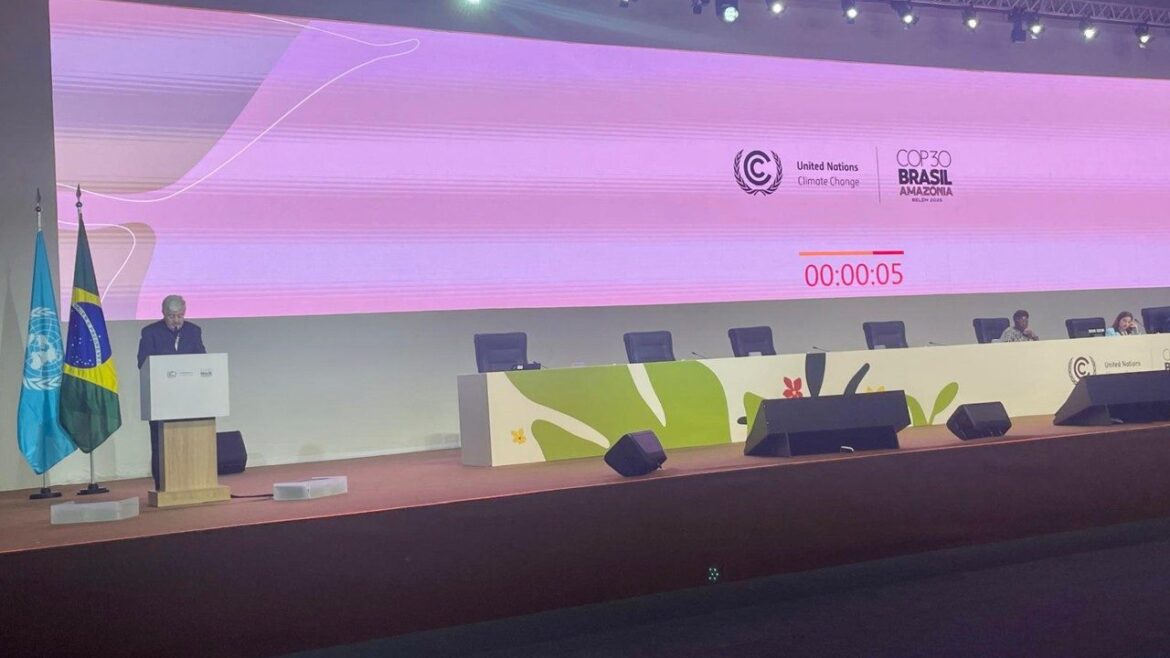
The head of the Holy See’s delegation to COP30 addresses environment ministers from around the world, stressing the need to strengthen multilateral cooperation and not lose sight of “the human face of the climate crisis.”
Alexandra Sirgant – Belém, Brazil
The political phase of COP30 entered its second stage on Monday, 17 November, as climate ministers arrived in Belém, ten days after heads of state and government had gathered.
On Tuesday, 18 November, the head of the Holy See’s delegation, Archbishop Giambattista Diquattro, took the floor to reiterate the Vatican’s priorities.
The Archbishop, who is Apostolic Nuncio to Brazil, opened his remarks by quoting Pope Francis’ message to COP30 participants, read by Cardinal Pietro Parolin on 7 November during the leaders’ summit.
Climate change is endangering “the lives of everyone on this planet”, the Pope had said, “and therefore require international cooperation and a cohesive and forward-looking multilateralism which puts the sacredness of life, the God-given dignity of every human being and the common good at its center”.
Multilateralism and a just transition
Archbishop Diquattro then outlined four key issues for the Holy See’s delegation, beginning with “cohesive and forward-looking multilateralism”.
“Climate change knows no borders, and therefore demands collective efforts,” he said. Only multilateralism can secure “respect for the dignity of persons, in such a way that ethics will prevail over local or contingent interests”, he added, recalling the words of Pope Francis in his apostolic exhortation Laudate Deum, published shortly before COP28 in Dubai.
It was at that same COP in 2023 that signatory states agreed to a gradual phase-out of fossil fuels—an energy transition supported by the Holy See, provided it is carried out with fairness and equity, “keeping in mind that the consequences of climate change primarily affect the poorest and most fragile”.
Women and girls on the front line
Archbishop Diquattro also emphasized “the human face of the climate crisis.”
The Holy See hopes the UN Gender Action Plan will acknowledge that women and girls—especially in the Global South—are disproportionately affected by climate change, the Archbishop said, and play a vital role in combating it.
“It is essential,” he stressed, “to search for common language and consensus”, putting aside “selfish interests, bearing in mind the responsibility for one another and for future generations”.
The role of education
Finally, faced with the scale of the climate challenge, “economic and operational resources are necessary but not enough.”
“We cannot achieve the goals of the Paris Agreement unless political and technical solutions are accompanied by an educational process that proposes new, sustainable ways of living and caring for creation,” the Apostolic Nuncio said.
“It is crucial to enhance the cross-cutting role of education to ensure that mitigation targets are met, adaptation challenges are addressed, means of implementation are strengthened, loss and damage are avoided, and progress is made,” he explained. The Archbishop then welcomed encouraging signals from many countries, which have added education-related elements to their updated Nationally Determined Contributions (NDCs) during the second round of proposals in Belém.
The Vatican diplomat brought his address by calling for a return to the heart, as Pope Leo urges: “It is only by returning to the heart that true ecological conversion can take place”.

